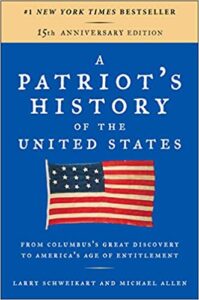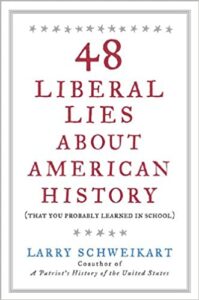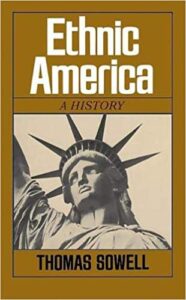Physical Address
304 North Cardinal St.
Dorchester Center, MA 02124
Physical Address
304 North Cardinal St.
Dorchester Center, MA 02124

The Best and Latest in Conservative Thought

Modern history wants to teach that America is structurally racist, a bastion of inequality and a warmonger. In fact, it’s the country that has raised more people out of poverty and tyranny than any other in history, but if you sit through a modern history class you’ll likely hear about none of that.
Born out of an opposition to tyranny in a wild and untamed land, it’s had its issues. At the same time American brought the world the Civil Rights movement while saving the world from dictators numerous times.
But perhaps more importantly than that, it’s given its own citizens the freedom to live their lives, freely and in a way that they want to live them.
“The dreams of people may differ, but everybody wants their dreams to come true. And America, above all places, gives us the freedom to do that.” – Ronald Reagan
A Patriot’s History of the United States

Professors Larry Schweikart and Michael Allen were dismayed with the tone they saw in American history books. While America has its flaws, modern history books increasingly rely on the theory that everything about this country is broken. With that in mind, these two authors decided to tell the history of America how it really happened, with a focus on the core values of what makes it so great. From Columbus to Trump, this book details the four pillars of America’s creation: Christianity, Common Law, Private Property and a Free Market Economy.
The Politically Incorrect Guide to American History

Most modern history books or history classes will tell you America was created by racists on land stolen as a part of a genocide and that only now through a massive push towards forced equality has it done any good. In fact, none of that is true.
Historian Thomas E Woods Jr. knows that all totalitarians shaped the future by reinventing their past. And that’s what’s happening in America now.
If you want the real truth about real America, this book has it all, from the earliest settlers, the drafting of the Constitution, the Civil War, World Wars and more. Why America was founded on religious freedom. Why the founders weren’t racists. Why the balance of power is built into each state. And why every Democrat program ever has been an abject failure.
Simple and factual, this book looks like a silly coffee-table page flipper but contains more truth than almost any dry text book ever has.
48 Liberal Lies About American History: (That You Probably Learned in School)

In America’s schools, America’s youth are being taught everything wrong. This books aims to set things right.
Tackling 48 common myths about American history, Larry Schweikart crushes popular myths taught as facts in today’s schools, including that capitalist greed brought about the Great Depression and that the Constitution was created by elitists to serve their own economic interests.
Also check out Schweikart’s earlier work, A Patriot’s History of the United States.
A History of the American People

From the author of Modern Times, comes another great and insightful book focused specifically on the foundation and ongoing legacy of the United States of America.
“The creation of the United States of America is the greatest of all human adventures,” says Johnson. “No other national story holds such tremendous lessons, for the American people themselves and for the rest of mankind.”
America’s history is told through the stories of men and women who shaped it, with numerous first person accounts, from letters to diaries and (in the modern era) recorded conversations.
Johnson tackles the struggle for independence, the stain of slavery and the roaring US economy.
Fundamentally he frames America and its people as a country filled with struggles but where problem solving is woven into its framework. The American people are called to be leaders, tackling issues and overcoming them with hard work, ingenuity and faith.
Ethnic America: A History

A history of immigrants to American as told by their economics. One of America’s great economic thinkers, Thomas Sowell, details the history of nine different ethnic groups (Irish, Germans, Jews, Italians, Chinese, African-Americans, Puerto Ricans, and Mexicans) from their arrival in the United States until today.
America: The Last Best Hope (volume i)

While so much of history focuses on the lessons (ie mistakes) we can learn from the past, William J Bennett takes the opposite approach. In this elegantly written tour through American personalities, he provides tales of inspiration from those elected officials who were chosen to lead.
Written more like a novel than a history book, this work provides incredible details of courage, prudence and hard work. It is a work of “informed patriotism” and doesn’t just tell the stories of the past, but weaves them into an understanding of present day.
“America, The Last Best Hope” was inspired by the Ronald Reagan’s farewell address in which he cautioned that if we forget what we’ve done, we’ll forget who we are.
The Politically Incorrect Guide to the Constitution

A frank discussion of not only what the Constitution is, but of how its creators understood it and how they would be vehemently opposed to how it has been distorted.
Kevin R C Gutzman documents the emergence of “Constitutional Law” and how the Supeme Court has distorted the Constitution to interject their own opinions on everything from same sex marriage to abortion.
He goes a step further to highlight how this federal legal system has put in place a centralized legal power that runs contrary to the intentions of the decentralized Constitution which put the power in the hands of the individual states.
The Politically Incorrect Guide to the Civil War

Another great book in “The Politically Incorrect Guide” series, this may be the most controversial yet.
There are plenty of basic history lessons about the major players, from Grant to Lee to Stonewall Jackson. There’s also a recounting of the most important battles.
But more than that, there’s a chapter on what might have happened had the South actually won. And no, it doesn’t include modern day slavery. In fact, author H. W. Crocker III argues that slavery would have been abolished peacefully like in every other Western country. And an America led by the South would likely have had numerous other benefits to its citizens and the world.
This book is filled with little known, yet fundamentally important truths about American history, like how Robert E. Lee had a higher regard for African Americans than Lincoln did
In a world where the Civil War has already been fundamentally re-written by the Left, arm yourself with these inconvenient facts.